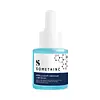What's inside
What's inside
 Key Ingredients
Key Ingredients

 Benefits
Benefits

 Concerns
Concerns

No concerns
 Ingredients Side-by-side
Ingredients Side-by-side

1,2-Butanediol
HumectantPEG/PPG/Polybutylene Glycol-8/5/3 Glycerin
HumectantBetaine
HumectantSodium Hyaluronate
HumectantEthylhexylglycerin
Skin ConditioningHydrolyzed Sodium Hyaluronate
Skin ConditioningSodium Acetylated Hyaluronate
HumectantSodium Hyaluronate Crosspolymer
HumectantPEG/PPG-17/6 Copolymer
SolventGlycerin
HumectantGlyceryl Glucoside
HumectantCreatine
Skin ConditioningPanthenol
Skin ConditioningAcrylates/C10-30 Alkyl Acrylate Crosspolymer
Emulsion StabilisingPropylene Glycol
HumectantPalmitoyl Tetrapeptide-7
Skin ConditioningPalmitoyl Pentapeptide-4
Skin ConditioningPalmitoyl Tripeptide-1
Skin ConditioningCarnosine
Skin ConditioningCetyl-Pg Hydroxyethyl Palmitamide
Skin ConditioningCeramide EOP
Skin ConditioningCeramide Ns
Skin ConditioningCeramide NP
Skin ConditioningCeramide As
Skin ConditioningCeramide AP
Skin ConditioningMaris Aqua
HumectantLaminaria Digitata Extract
Skin ProtectingAvena Sativa Kernel Extract
AbrasiveHydrogenated Lecithin
EmulsifyingTocopherol
AntioxidantAllantoin
Skin ConditioningGlyceryl Acrylate/Acrylic Acid Copolymer
HumectantPvm/Ma Copolymer
Emulsion StabilisingSodium PCA
HumectantGlycine
BufferingCholesterol
Emollient1,2-Butanediol, PEG/PPG/Polybutylene Glycol-8/5/3 Glycerin, Betaine, Sodium Hyaluronate, Ethylhexylglycerin, Hydrolyzed Sodium Hyaluronate, Sodium Acetylated Hyaluronate, Sodium Hyaluronate Crosspolymer, PEG/PPG-17/6 Copolymer, Glycerin, Glyceryl Glucoside, Creatine, Panthenol, Acrylates/C10-30 Alkyl Acrylate Crosspolymer, Propylene Glycol, Palmitoyl Tetrapeptide-7, Palmitoyl Pentapeptide-4, Palmitoyl Tripeptide-1, Carnosine, Cetyl-Pg Hydroxyethyl Palmitamide, Ceramide EOP, Ceramide Ns, Ceramide NP, Ceramide As, Ceramide AP, Maris Aqua, Laminaria Digitata Extract, Avena Sativa Kernel Extract, Hydrogenated Lecithin, Tocopherol, Allantoin, Glyceryl Acrylate/Acrylic Acid Copolymer, Pvm/Ma Copolymer, Sodium PCA, Glycine, Cholesterol
Onsen-Sui
Water
Skin ConditioningButylene Glycol
HumectantDipropylene Glycol
HumectantGlycereth-26
HumectantMethyl Gluceth-20
HumectantPentylene Glycol
Skin ConditioningPanthenol
Skin ConditioningChondrus Crispus Extract
Skin ConditioningGlucose
HumectantChlorella Vulgaris Extract
Skin ConditioningC12-14 Pareth-12
EmulsifyingSaccharum Officinarum Extract
MoisturisingFructose
HumectantFructooligosaccharides
HumectantCaprylyl Glycol
EmollientCarbomer
Emulsion StabilisingAmmonium Acryloyldimethyltaurate/Vp Copolymer
Tromethamine
BufferingSodium Hyaluronate
HumectantAdenosine
Skin ConditioningEthylhexylglycerin
Skin ConditioningHyaluronic Acid
HumectantSodium Phytate
Plumeria Alba Flower Oil
Hydrolyzed Hyaluronic Acid
HumectantHydroxypropyltrimonium Hyaluronate
Hydrolyzed Sodium Hyaluronate
Skin ConditioningSodium Acetylated Hyaluronate
HumectantPEG-9 Diglycidyl Ether/Sodium Hyaluronate Crosspolymer
Skin ConditioningPotassium Hyaluronate
Skin ConditioningPropanediol
SolventTocopherol
AntioxidantDimethylsilanol Hyaluronate
HumectantSodium Benzoate
Masking1,2-Hexanediol
Skin ConditioningOnsen-Sui, Water, Butylene Glycol, Dipropylene Glycol, Glycereth-26, Methyl Gluceth-20, Pentylene Glycol, Panthenol, Chondrus Crispus Extract, Glucose, Chlorella Vulgaris Extract, C12-14 Pareth-12, Saccharum Officinarum Extract, Fructose, Fructooligosaccharides, Caprylyl Glycol, Carbomer, Ammonium Acryloyldimethyltaurate/Vp Copolymer, Tromethamine, Sodium Hyaluronate, Adenosine, Ethylhexylglycerin, Hyaluronic Acid, Sodium Phytate, Plumeria Alba Flower Oil, Hydrolyzed Hyaluronic Acid, Hydroxypropyltrimonium Hyaluronate, Hydrolyzed Sodium Hyaluronate, Sodium Acetylated Hyaluronate, PEG-9 Diglycidyl Ether/Sodium Hyaluronate Crosspolymer, Potassium Hyaluronate, Propanediol, Tocopherol, Dimethylsilanol Hyaluronate, Sodium Benzoate, 1,2-Hexanediol
 Reviews
Reviews

Ingredients Explained
These ingredients are found in both products.
Ingredients higher up in an ingredient list are typically present in a larger amount.
Ethylhexylglycerin (we can't pronounce this either) is commonly used as a preservative and skin softener. It is derived from glyceryl.
You might see Ethylhexylglycerin often paired with other preservatives such as phenoxyethanol. Ethylhexylglycerin has been found to increase the effectiveness of these other preservatives.
This ingredient is created by putting sodium hyaluronate through hydrolysis.
You might know this as 'mini' or 'ultra low-molecular weight' hyaluronic acid. The small molecule size means it is able to travel deeper in the skin.
According to studies, low molecular-weight hyaluronic acid can:
One study from 2011 found ultra-low weight HA to show pro-inflammatory properties. Another study from 2022 found it to downregulate UV-B induced inflammation.
Hydrolysis is a process of changing a molecule using water or enzymes.
This ingredient is water-soluble.
Learn more about Hydrolyzed Sodium HyaluronatePanthenol is a common ingredient that helps hydrate and soothe the skin. It is found naturally in our skin and hair.
There are two forms of panthenol: D and L.
D-panthenol is also known as dexpanthenol. Most cosmetics use dexpanthenol or a mixture of D and L-panthenol.
Panthenol is famous due to its ability to go deeper into the skin's layers. Using this ingredient has numerous pros (and no cons):
Like hyaluronic acid, panthenol is a humectant. Humectants are able to bind and hold large amounts of water to keep skin hydrated.
This ingredient works well for wound healing. It works by increasing tissue in the wound and helps close open wounds.
Once oxidized, panthenol converts to pantothenic acid. Panthothenic acid is found in all living cells.
This ingredient is also referred to as pro-vitamin B5.
Learn more about PanthenolSodium Acetylated Hyaluronate is a type of Hyaluronic Acid.
Hyaluronic Acids help moisturize, soothe, and protect the skin.
Read about common types of Hyaluronic Acid here:
Sodium Hyaluronate
Hydrolyzed Hyaluronic Acid
Hyaluronic Acid
Sodium Hyaluronate is hyaluronic acid's salt form. It is commonly derived from the sodium salt of hyaluronic acid.
Like hyaluronic acid, it is great at holding water and acts as a humectant. This makes it a great skin hydrating ingredient.
Sodium Hyaluronate is naturally occurring in our bodies and is mostly found in eye fluid and joints.
These are some other common types of Hyaluronic Acid:
Learn more about Sodium HyaluronateTocopherol (also known as Vitamin E) is a common antioxidant used to help protect the skin from free-radicals and strengthen the skin barrier. It's also fat soluble - this means our skin is great at absorbing it.
Vitamin E also helps keep your natural skin lipids healthy. Your lipid skin barrier naturally consists of lipids, ceramides, and fatty acids. Vitamin E offers extra protection for your skin’s lipid barrier, keeping your skin healthy and nourished.
Another benefit is a bit of UV protection. Vitamin E helps reduce the damage caused by UVB rays. (It should not replace your sunscreen). Combining it with Vitamin C can decrease sunburned cells and hyperpigmentation after UV exposure.
You might have noticed Vitamin E + C often paired together. This is because it is great at stabilizing Vitamin C. Using the two together helps increase the effectiveness of both ingredients.
There are often claims that Vitamin E can reduce/prevent scarring, but these claims haven't been confirmed by scientific research.
Learn more about Tocopherol